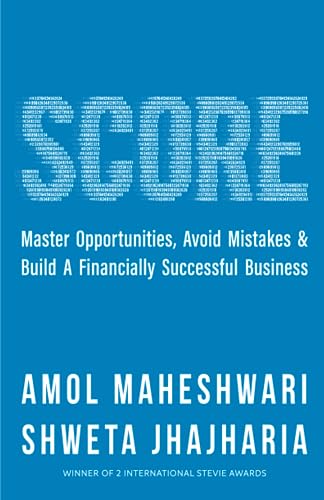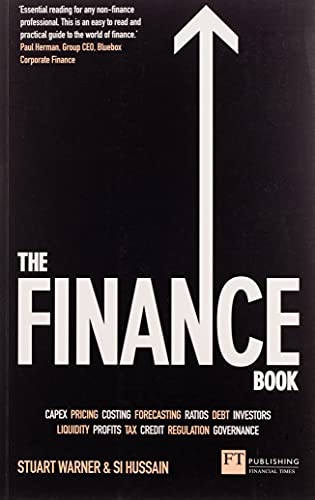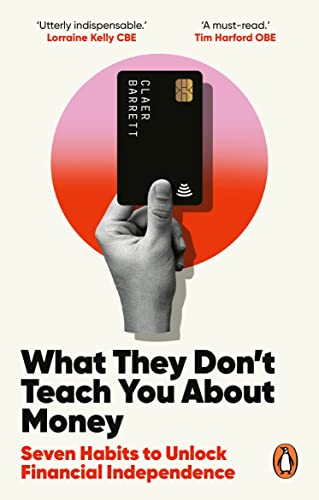
1

2

3

4

5
Attempting to understand finance alone is already an overwhelming prospect, but then widening this criteria to include finance from a business perspective only makes this task all the more daunting. Often, the process of learning about business finance is overcomplicated by the assumption that people already have a certain amount of knowledge about the field, resulting in the excessive use of technical jargon. These five books provide a great starting point for those wanting to learn about business finance, beginning by outlining the essential principles, and avoiding exceptionally advanced principles.
1
Amol Maheshwari and Shweta Jhajharia’s book provides the ultimate handbook to help SMEs master the fundamentals of finance, to propel them towards unprecedented success. Score is divided into three digestible sections, and when they are combined each element of the book provides a solid foundation for building a financially successful business. It allows everyone who reads it to be able to understand the key metrics needed to track performance and growth, and therefore become a better leader overall. The book was written for those who find themselves in business but have limited knowledge on the specific language that comes alongside this process, making it a must read for anyone aiming to understand business finance and how it underpins business success.
2
This book offers a simple, counterintuitive cash management solution that will help small businesses break out of the doom spiral and achieve instant profitability. Conventional accounting uses the logical (albeit, flawed) formula: Sales - Expenses = Profit. The problem is, businesses are run by humans, and humans aren't always logical. Serial entrepreneur Mike Michalowicz has developed a behavioral approach to accounting to flip the formula: Sales - Profit = Expenses. Just as the most effective weight loss strategy is to limit portions by using smaller plates, Michalowicz shows that by taking profit first and apportioning only what remains for expenses, entrepreneurs will transform their businesses from cash-eating monsters to profitable cash cows.
3
The overwhelming majority of finance books available are better suited to trainee accountants because they take an academic approach to finance. Whilst necessary for accountants, they immerse the reader in the “detail”. The Finance Book is written for non-finance people like you. It is aimed at those who work or aspire to work in business. It will help professionals in business or thinking about a career in business including board directors, business managers, MBA students, graduates and undergraduates. The book is purposefully designed to be quick and easy to use with no previous knowledge required to comprehend the concepts. We “tell you what you need to know” to quickly “get up to speed” in core finance concepts.
4
In The Psychology of Money, award-winning author Morgan Housel shares 19 short stories exploring the strange ways people think about money and teaches you how to make better sense of one of life's most important topics. Doing well with money isn't necessarily about what you know. It's about how you behave. And behavior is hard to teach, even to really smart people. Money investing, personal finance, and business decisions is typically taught as a math-based field, where data and formulas tell us exactly what to do. But in the real world people don't make financial decisions on a spreadsheet. They make them at the dinner table, or in a meeting room, where personal history, your own unique view of the world, ego, pride, marketing, and odd incentives are scrambled together.
5
TV and radio money-agony-aunt Claer Barrett teaches us what we need to know about money, in an accessible way that anyone can understand. By unpicking our emotional relationship with money, she gets to the heart of how our financial habits are formed - and reveals seven powerful yet easy ways to transform how we manage our money for good. If you struggle to understand where you're going wrong with your money but don't know where to start, What They Don't Teach You About Money has all the answers you've been searching for. There's no shaming finger-wagging or headache-inducing jargon, just hundreds of practical tips showing how to get money working for you. The financial world can be an intimidating place, but Claer will banish any lack of confidence, demystifying money matters to help you regain control of your finances - and she'll even make you laugh along the way.

1
Amol Maheshwari and Shweta Jhajharia’s book provides the ultimate handbook to help SMEs master the fundamentals of finance, to propel them towards unprecedented success. Score is divided into three digestible sections, and when they are combined each element of the book provides a solid foundation for building a financially successful business. It allows everyone who reads it to be able to understand the key metrics needed to track performance and growth, and therefore become a better leader overall. The book was written for those who find themselves in business but have limited knowledge on the specific language that comes alongside this process, making it a must read for anyone aiming to understand business finance and how it underpins business success.

2
This book offers a simple, counterintuitive cash management solution that will help small businesses break out of the doom spiral and achieve instant profitability. Conventional accounting uses the logical (albeit, flawed) formula: Sales - Expenses = Profit. The problem is, businesses are run by humans, and humans aren't always logical. Serial entrepreneur Mike Michalowicz has developed a behavioral approach to accounting to flip the formula: Sales - Profit = Expenses. Just as the most effective weight loss strategy is to limit portions by using smaller plates, Michalowicz shows that by taking profit first and apportioning only what remains for expenses, entrepreneurs will transform their businesses from cash-eating monsters to profitable cash cows.

3
The overwhelming majority of finance books available are better suited to trainee accountants because they take an academic approach to finance. Whilst necessary for accountants, they immerse the reader in the “detail”. The Finance Book is written for non-finance people like you. It is aimed at those who work or aspire to work in business. It will help professionals in business or thinking about a career in business including board directors, business managers, MBA students, graduates and undergraduates. The book is purposefully designed to be quick and easy to use with no previous knowledge required to comprehend the concepts. We “tell you what you need to know” to quickly “get up to speed” in core finance concepts.

4
In The Psychology of Money, award-winning author Morgan Housel shares 19 short stories exploring the strange ways people think about money and teaches you how to make better sense of one of life's most important topics. Doing well with money isn't necessarily about what you know. It's about how you behave. And behavior is hard to teach, even to really smart people. Money investing, personal finance, and business decisions is typically taught as a math-based field, where data and formulas tell us exactly what to do. But in the real world people don't make financial decisions on a spreadsheet. They make them at the dinner table, or in a meeting room, where personal history, your own unique view of the world, ego, pride, marketing, and odd incentives are scrambled together.

5
TV and radio money-agony-aunt Claer Barrett teaches us what we need to know about money, in an accessible way that anyone can understand. By unpicking our emotional relationship with money, she gets to the heart of how our financial habits are formed - and reveals seven powerful yet easy ways to transform how we manage our money for good. If you struggle to understand where you're going wrong with your money but don't know where to start, What They Don't Teach You About Money has all the answers you've been searching for. There's no shaming finger-wagging or headache-inducing jargon, just hundreds of practical tips showing how to get money working for you. The financial world can be an intimidating place, but Claer will banish any lack of confidence, demystifying money matters to help you regain control of your finances - and she'll even make you laugh along the way.
© Five Books 2026